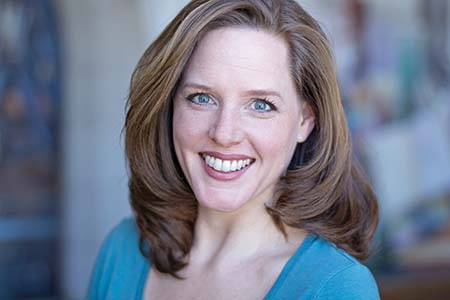
When Tony Caselli, artistic director of the
Williamston Theatre in Michigan, was struck with bacterial meningitis in 2014, the theatre’s development director went to work. Emily Sutton-Smith turned people who had been sharing concerns on social media into members of “Team Tony.”
Nobody felt obligated to buy a team T-shirt or to post a photo on Facebook wearing it, but everyone wanted to be part of the team. “I’ll never forget coming out of sedation and my wife showing me the phone,” Caselli recalls. “Who made 700 people buy shirts with my picture on them?” They weren’t just fashion statements either: While he was in a coma, Sutton-Smith had raised $14,000 for Caselli’s medical expenses.
Even when not raising money for someone in a health crisis, Sutton-Smith is a creative fundraiser for the theatre, which she co-founded with Caselli and two others (John Lepard, executive director, and Christine Purchis, managing director). They previously worked together at the Purple Rose Theatre Company in Chelsea, Mich. Sutton-Smith first trained as an actor at New York City’s Atlantic Theater Company, then at Michigan State University, where she earned an MFA and now teaches. She also studied pastry at the French Culinary Institute.
Development? She learned that on the job. In New York she paid the bills by working in offices, first at a youth theatre, then for a Broadway producer. When she moved to Michigan, she found work as an office manager at a movie house in Ann Arbor while appearing at most of the Equity theatres in the state. In short order she became film program manager, eventually shifting to development. Donor relations and grant writing fell largely to her.
When the Williamston Theatre founders began turning a furniture store into a theatre, initially with volunteer labor, including their own, Sutton-Smith was the one who raised money for renovations, leveraging state grants to raise matching funds from foundations and private donors. Each season the theatre looks better, feels more comfortable, and has better equipment.
The intimate stage and a personal approach help turn spectators into small donors who keep the doors open—doors where you can often meet the founders as they take tickets themselves. “We let them know we’re so glad they’re there,” Sutton-Smith says of the theatre’s loyal audience. “We really mean that, and it comes through.”
Sutton-Smith says it sometimes feels as if donations just fall into her lap. “At the end of our first season in 2007, our bank account was very empty,” she recalls. “A lovely old gentleman came into my office and gave me a check for $10,000. I burst into tears. All of a sudden we could start the next season. When the donor died, he left the theatre $25,000. He was an early angel for us.”
But those who work with her say her success at fundraising is no accident. “What I love about Emily is the passion she puts forth,” says Williamston board member and scenic designer Kirk Domer. “She’s not selling her product. She’s not doing an ask. She’s just sharing what’s unique about it.”
Sutton-Smith knows what the theatre has done for Williamston, which has come alive with restaurants and high-end stores since the theatre opened. She articulates that effectively, but she also gives the town full credit for welcoming the theatre. “I operate from a place of gratitude,” she says. So, apparently, do her patrons.

